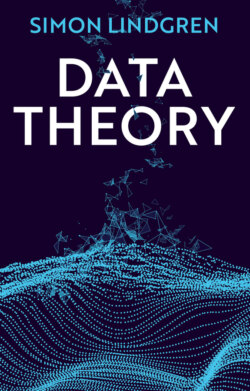Читать книгу Data Theory - Simon Lindgren - Страница 6
1 Beyond Method
ОглавлениеIn light of the developments towards a datafication of society, there is a need to reinvent and adapt our research approaches in order to make them more relevant and useful. This demands a creative and somewhat anarchistic approach to existing theories and methods.
Sociologist John Law argues, while acknowledging that conventional research methods are indeed useful in some cases, that there is an urgent need to ‘remake social science in ways better equipped to deal with mess, confusion and relative disorder’ (Law, 2004, p. 11). The need to go beyond methods as we know them is underpinned by the fact that social science is not very good at understanding ‘things that are complex, diffuse and messy’. This is because the simple and clear descriptions that most conventional research methods aim for ‘don’t work if what they are describing is not itself very coherent’ (Law, 2004, p. 2). Especially in light of the high level of complexity of twenty-first-century networked society, it is imperative that we develop more ambivalent methodologies to account for our increasingly ambivalent object of study.
Paul Feyerabend, the refreshingly provocative enfant terrible of the philosophy of science, wrote on the ‘complexity of human change’ and on the ‘unpredictable character of the ultimate consequences’ of people’s actions. ‘Are we really to believe’, he asked, ‘that the naive and simple-minded rules which methodologists take as their guide are capable of accounting for such a maze of interactions?’ (Feyerabend, 1975, p. 9). This question is today more relevant than ever, as datafication affects not only research practices, but also society as such, and thereby the very object of study of our research. Social expressions in the age of the internet are fragmented and entangled, in a system of platforms and relations enabled through digital technologies.
As argued by Nick Couldry and Andreas Hepp (2017), we now live in an age of deep mediatisation, where media can no longer be seen as specific channels of centralised content. Rather, media are now better understood as platforms for enacting social life (Dijck, Poell, and Waal, 2018). This is symptomatic of a transition from a mass media system to a social media ecology. The transformation has been described in terms of a rise of ‘mass self-communication’ (Castells, 2009), ‘networked individualism’ (Rainie and Wellman, 2012), and ‘connective action’ (Bennett and Segerberg, 2012). In sum, such perspectives argue that politics, opinions, and ideas, as well as social life in general now function in accordance with a much more decentralised and democratic logic (Ito, 2008), but also in more volatile and ‘viral’ ways (Sampson, 2012). This represents something much more than a mere technological transition. Following ongoing processes of digitalisation and datafication, our social world is suffused with technological media of communication that bring about a refiguring of the world in, and on, which we act. As argued by Couldry and Hepp (2017), social relations today are actualised through a system of variously connected digital platforms, that bring about a much more intense embedding of media in social processes than was ever the case before. Now there is a need to adapt social science theories and methods in hybrid ways to better account for this situation.
The digital society has been characterised as a ‘wicked system’ (Törnberg, 2017, p. 52), the analysis of which demands a critical methodological pluralism. In fact, most social systems have this emergent property of wickedness to some degree – a ‘combination of complexity and complicatedness that entails plasticity and deep ontological uncertainty’ (Törnberg, 2017, p. 25). In the specific case of social media and politics, internet researcher Helen Margetts and her colleagues argue that ‘social media are a source of instability and turbulence in political life’, which creates an uncertain environment (Margetts et al., 2017, p. 74). They suggest that:
Online platforms exhibit what other people are doing in real time and make other people aware of what they themselves are doing, creating feedback loops and chain reactions that draw in more people, whose actions in turn are likely to influence others. It seems reasonable to claim that mobilizations formed in this way are vulnerable to the impulses from which they start, which can push them over into critical mass, or cause them to fade and die almost as soon as they appear, making them hard to understand or predict.
(Margetts et al., 2017, p. 74)
As these authors argue, there is indeed a complexity (and complicatedness) of factors, levels, forces, and influences involved, at all levels of the social – especially in the digital society. And this book, in essence, is about approaching this complexity analytically, with a theoretical and methodological openness that can account for this turbulent, wicked, anarchistic, and ambivalent nature.
